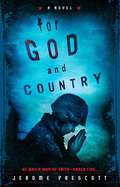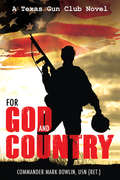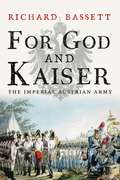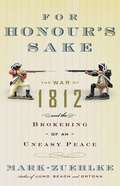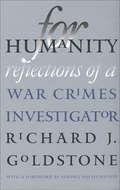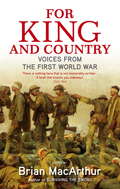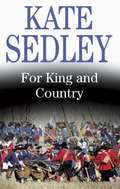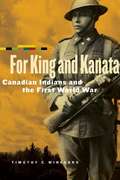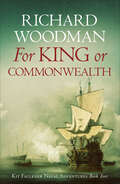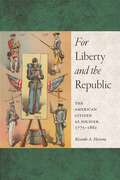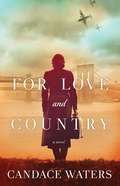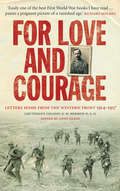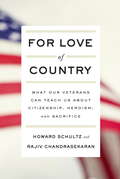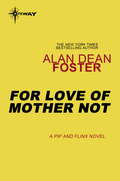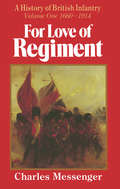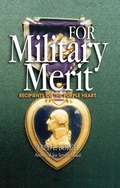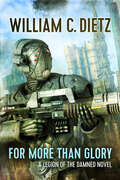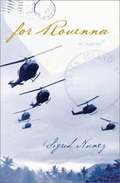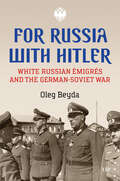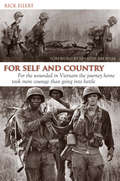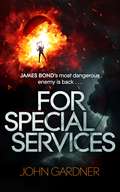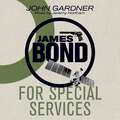- Table View
- List View
For God and Country
by Jerome PrescottThey say there are no atheists in foxholes. But the brutality of war can test the faith of even a U.S. Army Chaplain. The terrorist attacks of September 11, 2001 changed America as a nation, and changed millions of American lives. One of them was young seminary student Sean Rasmundsen. When his nation was attacked, he felt a new calling: to serve his country?and his God?in the armed forces as a chaplain. Eight years later, Sean is heading for his second tour of Iraq, where he?s stationed with the 69th Brigade Combat Team. They?ve been under fire from the enemy more often than not, they lost their beloved chaplain to an IED attack, and now Sean must find a way to help the troops keep their faith, even as he is undergoing a test of faith in himself, his country?and even the Almighty. But Sean knows in his heart there must be a God, just like he must believe there?s a heaven up there. Because it?s hell down here.
For God and Country: A Texas Gun Club Novel (The Texas Gun Club #3)
by Commander Mark BowlinIn WWII Italy, two soldiers have been granted a week of leave—but R&R is not in the cards for them…January 1944: The great Allied advance up the Italian peninsula has come to a halt before the formidable German Gustav Line at Monte Cassino. For the American soldiers in the valley, there is nothing to do but wait as General Mark Clark prepares his plan to shatter the German defenses and continue Fifth Army&’s march to Rome. Captain Perkin Berger and First Lieutenant Sam Taft are spared the monotony of waiting. They&’re given a week of well-deserved leave in an Adriatic resort town, where they have no responsibility other than relaxation. Proving the old maxim that no plan survives first contact with the enemy, Sam and Perk find themselves involved in the Canadian battle at Ortona, and once again they are thrust into the middle of a secret war between the Third Reich and the Vatican. When the cousins return from their R&R, it isn&’t long until the order is given. Against all sound military judgment, the exhausted and under-strength Gun Club is to cross the Rapido River and breach the Gustav Line—alone…
For God and Kaiser
by Richard BassettAmong the finest examples of deeply researched and colorfully written military history, Richard Bassett's For God and Kaiser is a major account of the Habsburg army told for the first time in English. Bassett shows how the Imperial Austrian Army, time and again, was a decisive factor in the story of Europe, the balance of international power, and the defense of Christendom. Moreover it was the first pan-European army made up of different nationalities and faiths, counting among its soldiers not only Christians but also Muslims and Jews. Bassett tours some of the most important campaigns and battles in modern European military history, from the seventeenth century through World War I. He details technical and social developments that coincided with the army's story and provides fascinating portraits of the great military leaders as well as noteworthy figures of lesser renown. Departing from conventional assessments of the Habsburg army as ineffective, outdated, and repeatedly inadequate, the author argues that it was a uniquely cohesive and formidable fighting force, in many respects one of the glories of the old Europe.
For Honour's Sake: The War of 1812 and the Brokering of an Uneasy Peace
by Mark ZuehlkeIn the tradition of Margaret MacMillan's Paris 1919 comes a new consideration of Canada's most famous war and the Treaty of Ghent that unsatisfactorily concluded it, from one of this country's premier military historians. In the Canadian imagination, the War of 1812 looms large. It was a war in which British and Indian troops prevailed in almost all of the battles, in which the Americans were unable to hold any of the land they fought for, in which a young woman named Laura Secord raced over the Niagara peninsula to warn of American plans for attack (though how she knew has never been discovered), and in which Canadian troops burned down the White House. Competing American claims insist to this day that, in fact, it was they who were triumphant.But where does the truth lie? Somewhere in the middle, as is revealed in this major new reconsideration from one of Canada's master historians. Drawing on never-before-seen archival material, Zuehlke paints a vibrant picture of the war's major battles, vividly re-creating life in the trenches, the horrifying day-to-day manoeuvring on land and sea, and the dramatic negotiations in the Flemish city of Ghent that brought the war to an unsatisfactory end for both sides. By focusing on the fraught dispute in which British and American diplomats quarrelled as much amongst themselves as with their adversaries, Zuehlke conjures the compromises and backroom deals that yielded conventions resonating in relations between the United States and Canada to this very day.From the Hardcover edition.
For Humanity: Reflections of a War Crimes Investigator
by Richard J. GoldstoneThroughout his career, the distinguished South African jurist Richard J. Goldstone has been deeply committed to promoting human rights in his own country and abroad. A justice of the Constitutional Court of South Africa since 1994, he has also served as chairperson of the Commission of Inquiry Regarding the Prevention of Public Violence and Intimidation in South Africa and chief prosecutor of the United Nations International Criminal Tribunals for the former Yugoslavia and Rwanda. In this engrossing and inspiring book, Justice Goldstone provides an intimate account of his progression from a young activist opposing South Africa's racial policies to the world's first independent war crimes prosecutor. Justice Goldstone begins by describing how he became involved in the transition of South Africa from an apartheid state to a democracy and why he was chosen in late 1992 to head the commission that investigated criminal conduct that accompanied that transition. He then considers his time as chief prosecutor for the United Nations Tribunals, speaking not only of the fundamental legal issues that have arisen but also of his personal experiences and feelings. Arguing in favor of the move toward establishing a permanent international criminal court, he offers a stirring defense of the role of international tribunals in holding human rights violators accountable.
For King And Country: Voices from the First World War
by Brian MacArthurFar more than an anthology, FOR KING AND COUNTRY is Brian MacArthur's attempt to write a history of the First World War by drawing on the writings of those who were present at the events they describe. Those writings will be drawn from a broad range of sources: from, most obviously, the officers and men who served on the western front at the Somme and elsewhere, accounts of fear and tedium, horror and occasional joy; also from those were left behind on the home front to wait for news of their loved ones.As well as letters, diary entries and memoir extracts, the book will also include the songs sung in the trenches by the men at the front; there are poems too, the less well known alongside the familiar. The material reproduced will be linked by Brian MacArthur's commentary and notes to create a seamless and movingly immediate narrative of the First World War.
For King And Country: Voices from the First World War
by Brian MacarthurFar more than an anthology, FOR KING AND COUNTRY is Brian MacArthur's attempt to write a history of the First World War by drawing on the writings of those who were present at the events they describe. Those writings will be drawn from a broad range of sources: from, most obviously, the officers and men who served on the western front at the Somme and elsewhere, accounts of fear and tedium, horror and occasional joy; also from those were left behind on the home front to wait for news of their loved ones. As well as letters, diary entries and memoir extracts, the book will also include the songs sung in the trenches by the men at the front; there are poems too, the less well known alongside the familiar. The material reproduced will be linked by Brian MacArthur's commentary and notes to create a seamless and movingly immediate narrative of the First World War.
For King and Country
by Kate SedleyIt is 1642, and civil war is beginning to split England in half. The dashing Cavaliers swear loyalty to the Crown; the stern Puritans vow to risk all for liberty and their mighty, wrathful God. . . and beautiful, fiery Lilias Pride will face the hardest choice of her life. Married to Richard Pride, MP for Bristol, she devotes her loyalty to him and to the Puritan cause. Yet Priam Lithgow, Royalist Earl of Chelwood, stirs her deeply, and when he falls into danger, she risks her life to save his. With the Restoration, Lilias hopes to flee love and peril and find safety in the New World of America. Yet she cannot escape her heart - or her destiny.
For King and Kanata: Canadian Indians and the First World War
by Timothy C. WinegardThe first comprehensive history of the Aboriginal First World War experience on the battlefield and the home front.When the call to arms was heard at the outbreak of the First World War, Canada’s First Nations pledged their men and money to the Crown to honour their long-standing tradition of forming military alliances with Europeans during times of war, and as a means of resisting cultural assimilation and attaining equality through shared service and sacrifice. Initially, the Canadian government rejected these offers based on the belief that status Indians were unsuited to modern, civilized warfare. But in 1915, Britain intervened and demanded Canada actively recruit Indian soldiers to meet the incessant need for manpower. Thus began the complicated relationships between the Imperial Colonial and War Offices, the Department of Indian Affairs, and the Ministry of Militia that would affect every aspect of the war experience for Canada’s Aboriginal soldiers.In his groundbreaking new book, For King and Kanata,Timothy C. Winegard reveals how national and international forces directly influenced the more than 4,000 status Indians who voluntarily served in the Canadian Expeditionary Force between 1914 and 1919—a per capita percentage equal to that of Euro-Canadians—and how subsequent administrative policies profoundly affected their experiences at home, on the battlefield, and as returning veterans.
For King or Commonwealth (Kit Faulkner Naval Adventures)
by Richard WoodmanThe nation is at arms… he must decide where his loyalty lies.1649. England has been torn asunder by a civil war that has pitted Parliamentarians against Royalists.Captain Kit Faulkner, bound to the Royalist cause, has been living in exile for the past four years, and must support himself with only the tiny rump of the Royal Navy that remains loyal.But when the predatory nature of Prince Charles becomes ever more obvious, Kit finds his loyalties to the crown tested like never before...A pulse-pounding naval adventure full of action and suspense, perfect for fans of Patrick O’Brian, Julian Stockwin and C. S. Forrester.Praise for Richard Woodman‘Woodman is a master of both maritime nonfiction and fiction’ Booklist‘Gripping … Woodman spins an exciting tale’ Publishers Weekly
For Liberty and the Republic: The American Citizen as Soldier, 1775-1861 (Warfare and Culture #6)
by Ricardo A HerreraIn the early decades of the American Republic, American soldiers demonstrated and defined their beliefs about the nature of American republicanism and how they, as citizens and soldiers, were participants in the republican experiment through their service. In For Liberty and the Republic, Ricardo A. Herrera examines the relationship between soldier and citizen from the War of Independence through the first year of the Civil War. The work analyzes an idealized republican ideology as a component of soldiering in both peace and war. Herrera argues that American soldiers’ belief system—the military ethos of republicanism—drew from the larger body of American political thought. This ethos illustrated and informed soldiers’ faith in an inseparable connection between bearing arms on behalf of the republic, and earning and holding citizenship in it. Despite the undeniable existence of customs, organizations, and behaviors that were uniquely military, the officers and enlisted men of the regular army, states’ militias, and wartime volunteers were the products of their society, and they imparted what they understood as important elements of American thought into their service. Drawing from military and personal correspondence, journals, orderly books, militia constitutions, and other documents in over forty archives in twenty-three states, Herrera maps five broad, interrelated, and mutually reinforcing threads of thought constituting soldiers’ beliefs: Virtue; Legitimacy; Self-governance; Glory, Honor, and Fame; and the National Mission. Spanning periods of war and peace, these five themes constituted a coherent and long-lived body of ideas that informed American soldiers’ sense of identity for generations.
For Love and Country: A Novel
by Candace WatersFor fans of Janet Beard&’s The Atomic City Girls and Marie Benedict&’s The Only Woman in the Room, this powerful, romantic novel tells the story of a woman determined to aid her country, finding love in the midst of tragedy along the way during World War II. When Lottie Palmer runs away the day before her wedding to join the Navy WAVES program, she not only leaves behind a fiancé, but also the privileged lifestyle that she has known as the daughter of one of the most important manufacturers in Detroit&’s auto industry. Spurred by a desire to contribute meaningfully to the war effort, Lottie pours all of her focus and determination into becoming the best airplane mechanic in the division, working harder than she&’s ever worked before. Her grit impresses her handsome instructor, Captain Luke Woodward. But when the war ramps up and she is assigned to Pearl Harbor she must fight her growing feelings for Luke and navigate her role as one of the only female mechanics among a group of men, all while finding out what it means to be your own hero. Illuminating the story of a woman who sets out to make a difference in the world by following her heart, Candace Waters draws on her extensive research, transporting us from Detroit to New York, and San Diego to Pearl Harbor during the tumultuous time of World War II.
For Love and Courage: The Letters of Lieutenant Colonel E.W. Hermon from the Western Front 1914 - 1917
by E. W. HermonLt Colonel E.W. Hermon died in a hail of bullets on the 9th April 1917, the first day of the Battle of Arras, leading his men of the 24th Battalion Northumberland Fusiliers into the attack. Like hundreds of thousands of others in the Great War, he gave his life for his King and country. He was shot through the heart, one bullet slicing through the papers in his top pocket, including the four-leaf clover his wife had given him for good luck. His final words to his Adjutant were 'Go on!' before he sank to his knees and died almost instantaneously. He was carried from the battlefield by his faithful soldier servant, Buxton, and now lies buried in the Commonwealth War Graves Cemetery at Roclincourt, three miles from Arras. This could have been the end of the story but he left a testament of his life and ideals in a unique and hitherto unknown and unpublished collection of long and detailed letters he wrote to his darling wife and his children, 'the Chugs'. Now, nearly a century after his death, he speaks to us of a past, less cynical life, where selflessness, honour, duty and courage were admired above all else. His own courage was officially recognised as he was mentioned in despatches three times and posthumously awarded the D.S.O.The letters have been transcribed and edited by Hermon's granddaughter Anne Nason with the guidance and historical advice of James Holland, the distinguished historian and writer. Peter Caddick-Adams, who works alongside Richard Holmes at Cranfield University, believes the letters to be unique in their candour and context since Hermon was Battalion Commander and thus his letters were not censored.
For Love and Glory
by Poul AndersonHugo and Nebula award winner Anderson incorporates two stories he wrote for the Asimov's Universe series into this absorbing posthumous novel, a fast-paced space opera that never lets the reader forget that aliens are alien. At a time when nearly immortal humans have colonized the galaxy, various space-faring species commingle freely and the residents of Earth have become as alien to other humans as true ETs, an astronomical event that may affect all existence is about to take place. Unfortunately, only one set of aliens knows what that event is and their ruling dictatorship is hell-bent on keeping it that way. Lissa Windholm, an Earth woman with a spirit of adventure men find attractive, is determined to uncover the mystery and share the knowledge with everyone. Lissa and her partner Karl, a tyrannosaurus-like scientist, make some startling archaeological discoveries on the planet Jonna about beings known as the Forerunners, but a psychologically scarred starship captain and an impressively ancient and profit-minded human rogue have other plans for the relics.
For Love of Country
by Rajiv Chandrasekaran Howard SchultzA celebration of the extraordinary courage, dedication, and sacrifice of this generation of American veterans on the battlefield and their equally valuable contributions on the home front. Because so few of us now serve in the military, our men and women in uniform have become strangers to us. We stand up at athletic events to honor them, but we hardly know their true measure. Here, Starbucks CEO and longtime veterans' advocate Howard Schultz and National Book Award finalist Rajiv Chandrasekaran of The Washington Post offer an enlightening, inspiring corrective. The authors honor acts of uncommon valor in Iraq and Afghanistan, including an Army sergeant who repeatedly runs through a storm of gunfire to save the lives of his wounded comrades; two Marines who sacrifice their lives to halt an oncoming truck bomb and protect thirty-three of their brothers in arms; a sixty-year-old doctor who joins the Navy to honor his fallen son. We also see how veterans make vital contributions once they return home, drawing on their leadership skills and commitment to service: former soldiers who aid residents in rebuilding after natural disasters; a former infantry officer who trades in a Pentagon job to teach in an inner-city neighborhood; a retired general leading efforts to improve treatments for brain-injured troops; the spouse of a severely injured soldier assisting families in similar positions. These powerful, unforgettable stories demonstrate just how indebted we are to those who protect us and what they have to offer our nation when their military service is done.From the Hardcover edition.
For Love of Mother-Not (Gateway Essentials #522)
by Alan Dean FosterThey called him Flinx...He was just a freckle-faced, redheaded kid with green eyes and a strangely compelling stare when Mother Mastiff first saw him on the auctioneer's block. One hundred credits and he was hers. For years the old woman was his only family. She loved him, fed him, taught him everything she knew - even let him keep the deadly flying snake he called Pip. Then Mother Mastiff mysteriously disappeared and Flinx took Pip to tail her kidnappers. Across the forests and swamps of the winged world called Moth, their only weapons were Pip's venom...and Flinx's unusual Talents.
For Love of Regiment: A History of British Infantry, Volume One, 1660–1914
by Charles MessengerThe author explains how the tradition of loyalty to the regiment has served the British Army so well over the past 350 years and, in his vivid description of some of the major campaigns in which it has fought, shows what it was like at various times to have been an officer or a soldier in the British Army.
For Love of a Dog
by Janice CarterA soldier’s best friend?Army captain Luca Rossi hasn’t forgotten the dog who saved his life in Afghanistan. He just didn’t expect to be reunited with him on an Ohio soybean farm. Kai Westfield, the photojournalist who agreed to transport Amigo back to the States, has a different future in mind for the mutt that’s bringing her orphaned nephew out of his grief. This tranquil, beautiful place is also healing the wounded soldier…and Kai deserves credit, too. But she’s only holding down the fort here until her dad recovers his good health; she can’t wait to get back to the big city. Can Luca summon the strength to stop Kai—and the peaceful life he envisions with her—from slipping away for good?
For Military Merit
by Fred BorchMore than one million men and women have received the Purple Heart since its creation as an award "for military merit" in 1932. This book provides a brief history of the Purple Heart, with a focus on how the decoration's award criteria have evolved. The book then takes a representative look at Purple Heart recipients from all the services by conflict, concluding with Afghanistan and Iraq.Among the recipients highlighted are: Civil War veteran Pvt. Oran Randlett, who, in 1937, received two Purple Hearts for wounds received at Chancellorsville in 1863 and Cold Harbor in 1864; Brig. Gen. Robert Frederick, who received a record eight Purple Hearts for wounds in World War II; and crew members of USS Panay, who were awarded Purple Hearts fifty-five years after the 1937 Japanese attack on their gunboat.
For More Than Glory (Legion of the Damned #5)
by William C. DietzNational bestselling science fiction master William C. Dietz continues his Legion of the Damned series as the balance of power on a remote planet may decide the fate of the battered Confederacy…Second Lieutenant Antonio Santana had earned respect and honor battling the Thrakies—until he refused an order to fire on unarmed civilians. Now he’s been busted down a rank and posted to the isolated planet of LaNor.Since its recent discovery, LaNor has attracted the attention of every political and economic power of every species in the still-precarious Confederacy of Sentient Beings—all with an eye to exploiting both its location and its natural resources. As for the native LaNorians, little concern is paid to them except as a steady supply of cheap labor.But the LaNorians have had enough of this unwelcome colonization—and are ready to strike back at those who have corrupted their homeworld. Led by their Empress, they launch an all-out rebellion in against the invaders. Surrounded by a fanatical horde, all the competing interests are forced to band together for survival in an unlikely alliance held together both by the courage of Santana and the diplomatic prowess of his sometime lover Christine Vanderveen.But even as the Legion and its newfound allies struggles to fend off wave after bloody wave of furious attacks, Santana slowly begins to suspect that they all may be pawns in a much greater and deadlier campaign. That someone or something else is behind the uprising. And that their true objective is to spread the chaos of war far beyond LaNor…“[An] elaborate military-political thriller…Dietz has created an intricate tapestry of local and star-faring culture with topnotch action sequences.”—Publishers Weekly"Dietz's expertise in matters of mayhem is second to none.”—The Oregonian“Fans of military science-fiction really need not look any further than this series…this is as good as it gets.”—Mass Movement
For Rouenna
by Sigrid NunezAfter my first book was published, I received some letters. So begins Sigrid Nunez's haunting novel about the poignant and unusual friendship between a novelist and the retired army nurse who seeks her out. Among the letters the narrator receives is one from a Rouenna Zycinski, who recalls a forgotten childhood connection and asks for a meeting. First wary, then fascinated by the stories Rouenna tells about her life as a combat nurse in Vietnam, the narrator flatly declines her request that they collaborate on a memoir. Only later, in the aftermath of Rouenna's shocking death, is the narrator drawn to write about her friend-and her friend's war. Writing Rouenna's story becomes all-consuming, at once a necessity and a solace. For Rouenna, an unforgettable novel about truth, memory, and unexpected heroism, is also a remarkable and surprising new look at war by one of the most gifted writers of her generation.
For Russia with Hitler: White Russian Émigrés and the German-Soviet War
by Oleg BeydaThe Bolshevik takeover of Russia created an alternative Russia in exile that never laid down its arms. For two decades, expelled White Russians sought ways to retaliate against the Soviet Union and return home. Their irreconcilability was galvanized by a superstructure, the dominant military organization, the Russian All-Military Union (ROVS). Eventually, militant anti-Bolshevism led the exiled Russians into alliance with Nazi Germany, despite the latter’s anti-Slavic stance. For Russia with Hitler tells the story of how thousands of White Russian émigrés joined the German invasion of the Soviet Union as soldiers, translators, and civilian workers. Oleg Beyda investigates and contextualizes émigré collaboration with National Socialist Germany, explaining how it was possible for Russians to fight against the Russians. The book reveals that the exiles, although united ideologically by Russian nationalism in a general sense, did not establish one single, clear-cut political solution for a future “liberated Russia.” Drawing on wide archival material, For Russia with Hitler details the background and ideological framework of the émigrés, how they rationalized their support for Nazism, and what they did on the Eastern Front, including their reactions to life in occupation, war crimes, and the Holocaust.
For Self and Country
by Rick EilertJust a few months after enlisting in the Marine Corps and being sent to Vietnam, nineteen-year-old Rick Eilert was seriously injured in combat and transferred to Great Lakes Naval Hospital in Illinois for a long and painful recovery. Eilert tells not only his own story but the stories of the men around him whose friendship, humor, and courage sustained him. Eilert describes the hospital as a place of emotional and physical rehabilitation and pays tribute to those who cared for them. When the book was first published in 1983, he was awarded the George Washington Medal by the Freedoms Foundation and invited to the Oval Office by President Ronald Reagan.
For Special Services: A James Bond Novel (James Bond #17)
by John GardnerOfficial, original James Bond from a writer described by Len Deighton as a 'master storyteller'.In this heart-stopping thriller, James Bond teams up with CIA agent Cedar Leiter, to investigate a dangerous criminal, suspected of reviving the notorious organisation SPECTRE. The organisation was believed to have been disbanded years earlier following the death of its leader, Ernst Stavro Blofeld, at the hands of Bond (in You Only Live Twice), but it seems that this is far from true.Bond discovers that the revitalised SPECTRE has the most devastating, world-threatening plans: to gain control of America's military space satellite network.
For Special Services: A James Bond Novel (James Bond #17)
by John GardnerIn this second instalment of John Gardner's Bond series, Bond teams up with CIA agent Cedar Leiter, daughter of his old friend Felix Leiter, to investigate Markus Bismaquer, who is suspected of reviving the notorious criminal organisation SPECTRE.Read by Jeremy Northam(p) 2011 Orion Publishing Group
